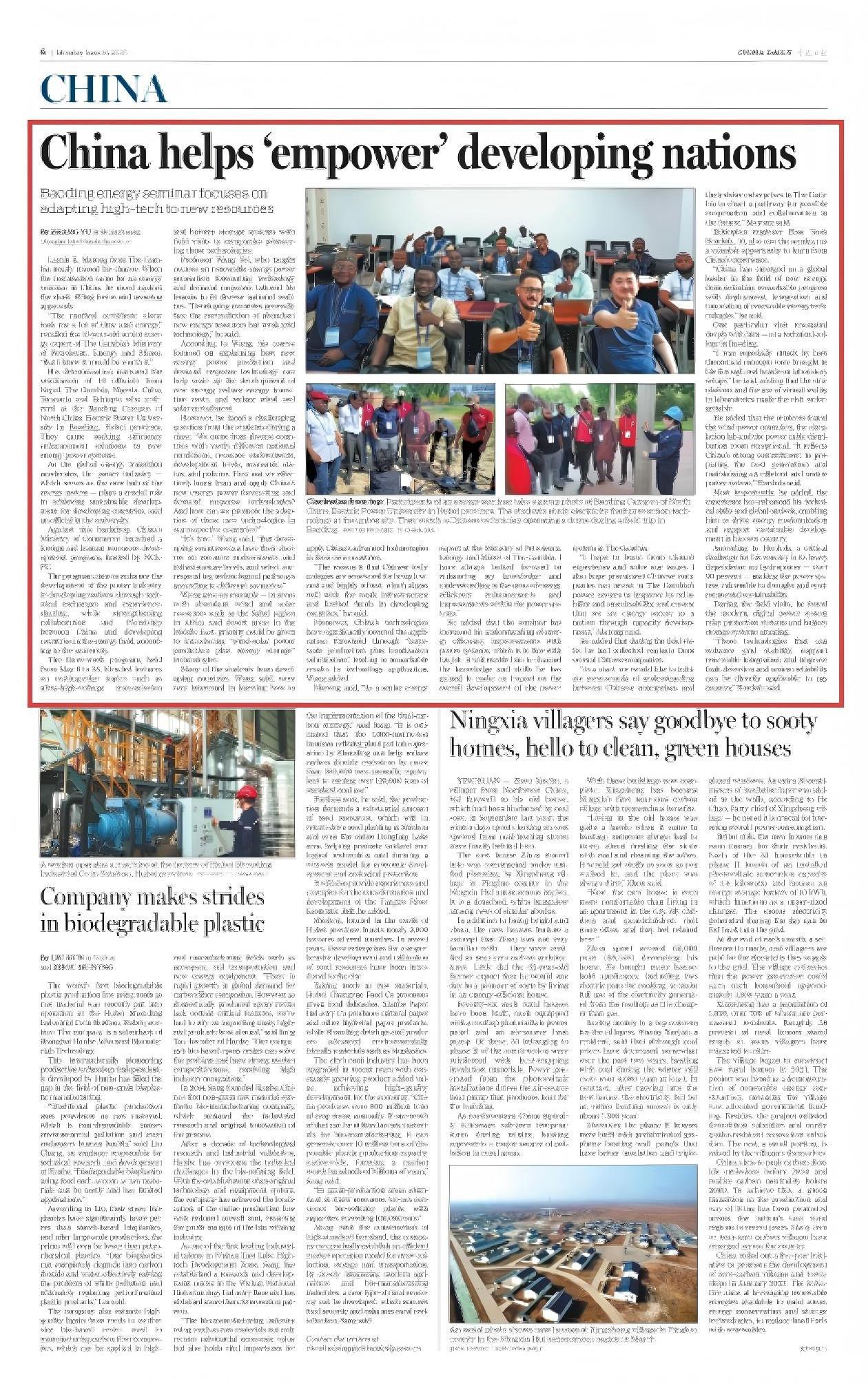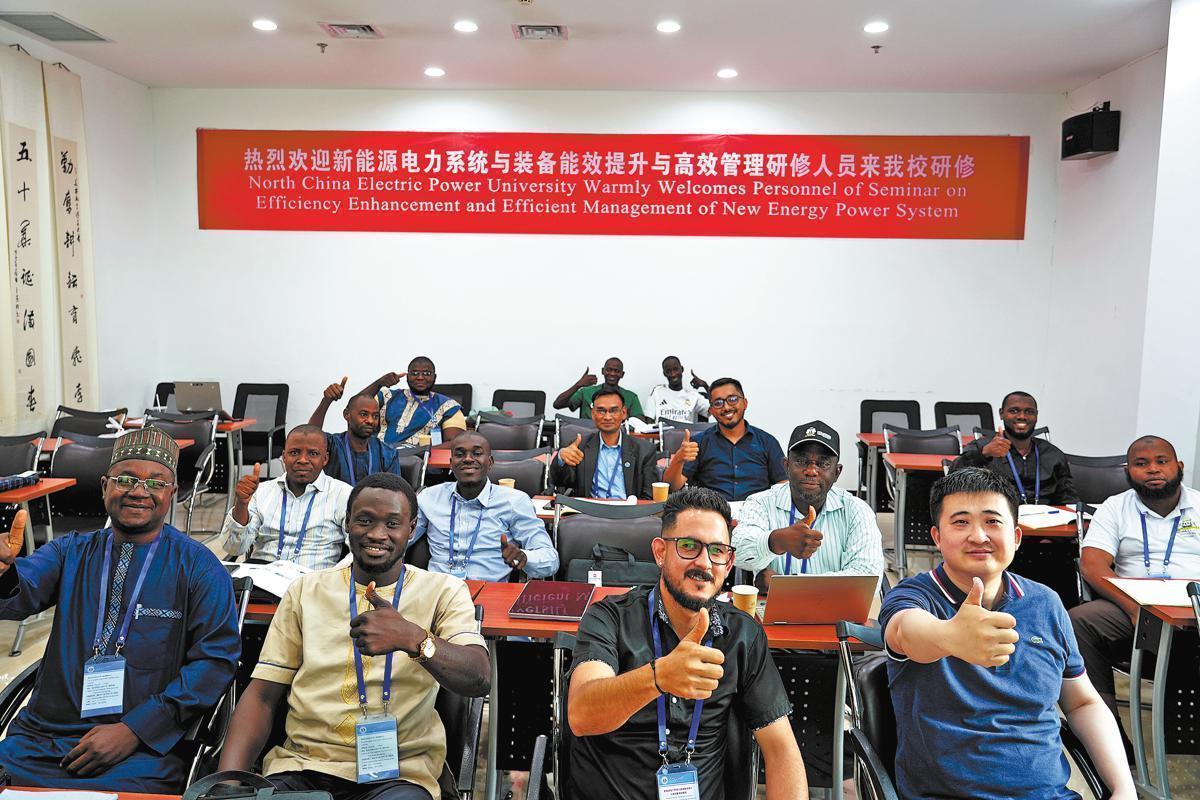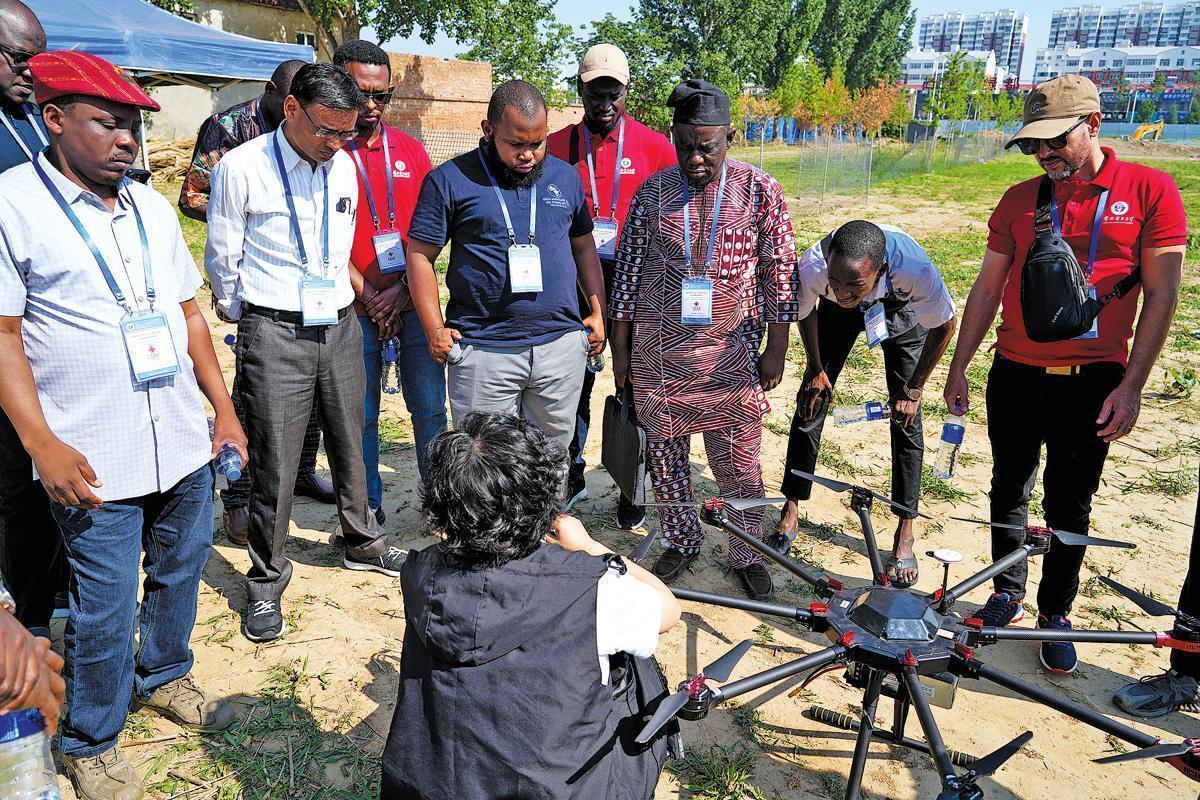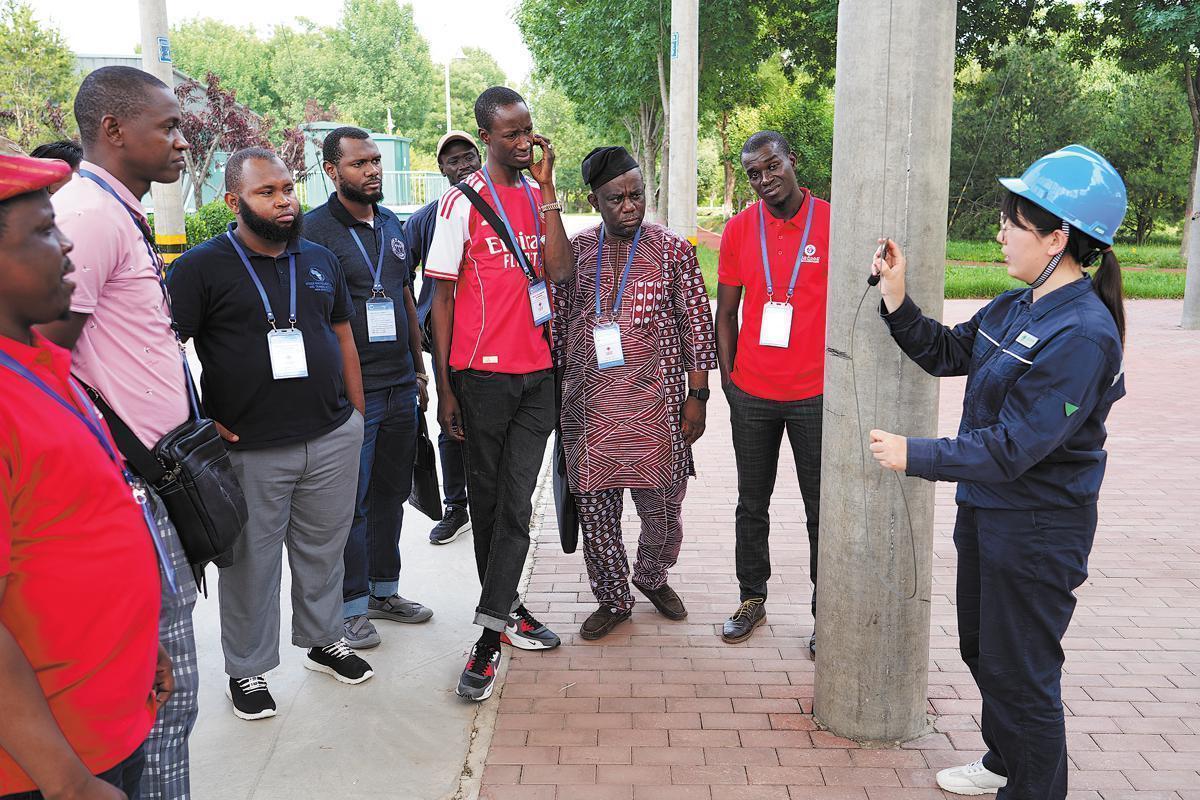【China Daily】China helps 'empower' developing nations Baoding energy seminar focuses on adapting high-tech to new resources


Participants of an energy seminar take a group photo at Baoding Campus of North China Electric Power University in Hebei province. [Photo provided to CHINA DAILY]

The students study electricity theft prevention technology at the university. [Photo provided to CHINA DAILY]

They watch a Chinese technician operating a drone during a field trip in Baoding. [Photo provided to CHINA DAILY]
Lamin K. Marong from The Gambia nearly missed his chance. When the nomination came for an energy seminar in China, he raced against the clock, filling forms and securing approvals.
"The medical certificate alone took me a lot of time and energy," recalled the 37-year-old senior energy expert of The Gambia's Ministry of Petroleum, Energy and Mines. "But I knew it would be worth it."
His determination mirrored the sentiments of 16 officials from Nepal, The Gambia, Nigeria, Cuba, Tanzania and Ethiopia who gathered at the Baoding Campus of North China Electric Power University in Baoding, Hebei province. They came seeking efficiency enhancement solutions to new energy power systems.
As the global energy transition accelerates, the power industry — which serves as the core hub of the energy system — plays a crucial role in achieving sustainable development for developing countries, said an official in the university.
Against this backdrop, China's Ministry of Commerce launched a foreign aid human resources development program, hosted by NCEPU.
The program aims to enhance the development of the power industry in developing nations through technical exchanges and experience-sharing, while strengthening collaboration and friendship between China and developing countries in the energy field, according to the university.
The three-week program, held from May 8 to 28, blended lectures on cutting-edge topics such as ultra-high-voltage transmission and battery storage systems with field visits to companies pioneering these technologies.
Professor Wang Fei, who taught courses on renewable energy power generation forecasting technology and demand response, tailored his lessons to fit diverse national realities. "Developing countries generally face the contradiction of abundant new energy resources but weak grid technology," he said.
According to Wang, his course focused on explaining how new energy power prediction and demand response technology can help scale up the development of new energy, reduce energy transition costs, and reduce wind and solar curtailment.
However, he faced a challenging question from the students during a class: "We come from diverse countries with vastly different national conditions, resource endowments, development levels, economic status, and policies. How can we effectively learn from and apply China's new energy power forecasting and demand response technologies? And how can we promote the adoption of these new technologies in our respective countries?"
"It's true," Wang said. "But developing countries can base their choices on resource endowments and infrastructure levels, and select corresponding technological pathways according to different scenarios."
Wang gave an example — in areas with abundant wind and solar resources such as the Sahel region in Africa and desert areas in the Middle East, priority could be given to introducing "wind-solar power prediction plus energy storage" technologies.
Many of the students from developing countries, Wang said, were very interested in learning how to apply China's advanced technologies in their own countries.
"The reason is that Chinese technologies are renowned for being low-cost and highly robust, which aligns well with the weak infrastructure and limited funds in developing countries," he said.
Moreover, China's technologies have significantly lowered the application threshold through "large-scale production plus localization substitution", leading to remarkable results in technology application, Wang added.
Marong said, "As a senior energy expert at the Ministry of Petroleum, Energy and Mines of The Gambia, I have always looked forward to enhancing my knowledge and understanding in the areas of energy efficiency enhancements and improvements within the power systems."
He added that the seminar has increased his understanding of energy efficiency improvements with power systems, which is in line with his job; it will enable him to channel the knowledge and skills he has gained to make an impact on the overall development of the power system in The Gambia.
"I hope to learn from China's experience and solve our issues. I also hope prominent Chinese companies can invest in The Gambia's power system to improve its reliability and sustainability, and ensure that we are energy secure as a nation through capacity development," Marong said.
He added that during the field visits, he had collected contacts from several Chinese companies.
"As a start, we would like to initiate memoranda of understanding between Chinese enterprises and their sister enterprises in The Gambia to chart a pathway for possible cooperation and collaboration in the future," Marong said.
Ethiopian engineer Ebsa Tesfa Hordofa, 33, also saw the seminar as a valuable opportunity to learn from China's experience.
"China has emerged as a global leader in the field of new energy, demonstrating remarkable progress with deployment, integration and innovation of renewable energy technologies," he said.
One particular visit resonated deeply with him — at a technical college in Baoding.
"I was especially struck by how theoretical concepts were brought to life through real hands-on laboratory setups," he said, adding that the simulations and the use of virtual reality in laboratories made the visit unforgettable.
He added that the students found the wind power operation, the simulation lab and the power cable distribution room exceptional. "It reflects China's strong commitment to preparing the next generation and maintaining an efficient and secure power system," Hordofa said.
Most importantly, he added, the experience has enhanced his technical skills and global outlook, enabling him to drive energy modernization and support sustainable development in his own country.
According to Hordofa, a critical challenge for his country is its heavy dependence on hydropower — over 90 percent — making the power system vulnerable to drought and environmental sustainability.
During the field visits, he found the modern, digital power system relay protection systems and battery storage systems amazing.
"These technologies that can enhance grid stability, support renewable integration and improve fault detection and system reliability can be directly applicable to my country," Hordofa said.
中国助力发展中国家能源建设 (简要版)
来自冈比亚的37岁的石油、能源和矿业部高级能源专家拉明·K·马龙 (Lamin K. Marong) 差点错过这次来华研修的机会。“光是医疗证明就花了我很多时间和精力,”他回忆道。“但我知道这是值得的。”他道出了来自尼泊尔、冈比亚、尼日利亚、古巴、坦桑尼亚和埃塞俄比亚的16名学员的共同心声。他们齐聚华北电力大学保定校区,寻求提升新能源电力系统效率的解决方案。
据校方介绍,该项目旨在通过技术交流与经验分享,促进发展中国家电力行业发展,同时加强中国与发展中国家在能源领域的合作与友谊。
这场为期三周的新能源电力系统与装备能效提升与高效管理研修班,由中华人民共和国商务部主办,华北电力大学承办。内容融合了超高压输电、储能系统集成等前沿主题讲座,以及对相关企业的实地考察访问。
针对发展中国家在新能源开发中普遍面临的“资源丰富但电网薄弱”的核心矛盾,华北电力大学电力工程系王飞老师专门定制了新能源功率预测技术与应用和需求侧响应的授课内容,他的课程重点在于解释新能源功率预测技术和需求侧响应技术如何帮助扩大新能源开发规模、降低能源转型成本以及减少弃风弃光现象。
课程内容重点解决各国在国情、资源、经济及政策差异较大的情况下,如何有效学习并落地应用中国的新能源功率预测和需求侧响应技术等关键问题。
王飞提到,“中国的技术‘低成本、高效能’完全契合发展中国家基础设施薄弱、资金有限的现实情况。”“规模化生产加本土化替代”有效降低了技术落地的门槛和应用难度。发展中国家可以根据资源禀赋和基础设施水平,在不同应用场景下选择相应的技术路径。
冈比亚石油、能源和矿业部高级能源专家拉明·K·马龙明确表示,研修班显著提升了他对电力系统能效的理解,其目标是将所学应用于冈比亚电力发展。他表示,“希望借鉴中国经验解决问题,并期待中国企业投资冈比亚,提高电力系统可靠性、可持续性和国家能源安全。”目前,他已收集了多家中国企业的联系方式,计划推动签署谅解备忘录,为未来可能的合作与协作规划路径。
同样,33岁的埃塞俄比亚工程师霍尔多法将此次访问视为向新能源领域“全球领导者”学习的宝贵机会。他在实地考察过程中惊叹于理论实践的高度融合,相关实验室的参观内容反映了中国对下一代人才培养与电网安全的承诺。霍尔多法谈到,埃塞俄比亚电力系统严重依赖水电(超90%),易受干旱影响,而中国的储能系统集成与现代化数字继电保护技术能直接应用于本国,以增强电网稳定性、支持可再生能源并网、改进故障检测和提高系统可靠性。



